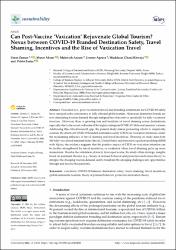Can post-vaccine ‘vaxication’ rejuvenate global tourism? Nexus between COVID-19 branded destination safety, travel shaming, incentives and the rise of vaxication travel
Citation
Zaman, U.; Aktan, M.; Anjam, M.; Agrusa, J.; Khwaja, M.G.;Farías, P. Can Post-Vaccine ‘Vaxication’ Rejuvenate Global Tourism? Nexus between COVID-19 Branded Destination Safety, Travel Shaming, Incentives and the Rise of Vaxication Travel. Sustainability 2021, 13, 14043. https://doi.org/10.3390/su132414043Abstract
Vaxication (i.e., post-vaccination travel) and branding destinations for COVID-19 safety have emerged as the cornerstones to fully rebound global tourism. Numerous destination brands are now stimulating tourism demand through realigned travel incentives specifically for fully vaccinated travelers. However, there is growing fear and incidents of travel shaming across destinations, especially due to the recent outbreaks of the highly contagious COVID-19 ‘delta and omicron’ variants. Addressing this critical research gap, the present study makes pioneering efforts to empirically examine the effects of COVID-19 branded destination safety (CBDS) on vaxication intentions, under the moderating influence of travel shaming and travel incentives. Drawing on study data from 560 fully-vaccinated residents from Hawaii, United States and structural equation modeling (SEM) with Mplus, the evidence suggests that the positive impact of CBDS on vaxication intention can be further strengthened by travel incentives, or weakened when travel shaming picks up more momentum. Besides the validation of newly developed scales, the study offers strategic insights based on dominant theories (e.g., theory of planned behavior and protection motivation theory) to interpret the changing tourism demand, and to transform the emerging challenges into opportunities through and beyond the pandemic. © 2021 by the authors. Licensee MDPI, Basel, Switzerland.


















